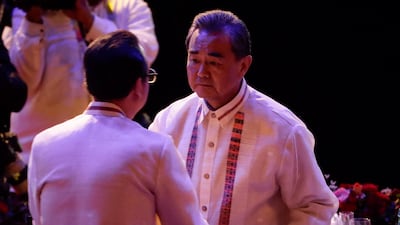MANILA // South East Asian foreign ministers called for militarisation to be avoided in the South China Sea and expressed concern about island-building, ending an impasse over how to address disputes with China.
The communique late on Sunday came after two days of busy diplomacy ahead of a Association of South East Asian Nations meeting in Manila.
Earlier, China's foreign minister said new UN Security Council sanctions on North Korea were the right response to a series of missile tests, but dialogue was vital to resolve the issue, now at a "critical juncture".
Wang Yi described talks with North Korean foreign minister Ri Yong Ho as "very thorough" and advised him to calmly assess the UN resolutions and not carry out further nuclear tests that would only stoke tensions.
But for Asean, the South China Sea has long been the most divisive issue, with China's influence looming large over its activities. Some countries are wary about the possible repercussions of defying Beijing by taking a stronger stand.
Asean failed to issue the customary statement on Saturday, over what diplomats said was disagreement about whether to make oblique references to China's rapid expansion of its defence capabilities on artificial islands in disputed waters.
China is sensitive to even a veiled reference by Asean to its seven reclaimed reefs, three of which have runways, missile batteries, radars and, according to some experts, the capability to accommodate fighter jets.
The communique took a stronger position than an earlier, unpublished draft, which was a watered-down version of one issued last year in Laos.
The agreed text "emphasised the importance of non-militarisation and self-restraint".
It said that after extensive discussions, concerns were voiced by some members about land reclamation "and activities in the area which have eroded trust and confidence, increased tension and may undermine peace, security and stability".
Asean's deadlock over the statement highlights China's growing influence on the grouping at a time of uncertainty over the new US administration's security priorities and whether it will try to keep China's maritime activities in check.
Several Asean diplomats said that among the members who pushed for a communique that retained the more contentious elements was Vietnam, which has competing claims with China over the Paracel and Spratly archipelago and has had several spats with Beijing over energy concessions.
Another diplomat, however, said there was no real disagreement on the contents of the communique and stressed that the initial draft was seen by some members as weak.
Also on Sunday the foreign ministers of Asean and China adopted a negotiating framework for a code of conduct in the South China Sea, a move they hailed as progress but seen by critics as a tactic to buy China time to consolidate its maritime power.
The developments came as a highly-anticipated meeting between China and Manila took place in Manila after the UN Security Council unanimously imposed new sanctions on Pyongyang over its two July intercontinental ballistic missile tests, a move that could slash North Korea's $3 billion annual export revenue by a third.
Mr Wang said diplomatic and peaceful means were now necessary to avoid tensions and an escalation of the crisis.
"We call on all sides to take a responsible attitude when making judgements and taking actions," he said.
"We cannot do one and neglect the other. Sanctions are needed but sanctions are not the final goal.”
North Korea has been under UN sanctions since 2006. The new measures were a response to five nuclear tests and four long-range missile launches.
The US, which has long maintained that China has not done enough to rein in North Korea, negotiated with China for a month on the new resolution before putting it to the Security Council.
It bans North Korean exports of coal, iron, iron ore, lead, lead ore and seafood and prohibits countries from hiring additional North Korean labourers. It also bars new joint ventures with North Korea.
The standoff is expected to dominate Monday's Asean Regional Forum, which gathers 27 foreign ministers, including former participants in the halted six-party talks - Russia, Japan, the United States, China and North and South Korea.
Mr Wang's meeting with North Korea's Mr Ri started off cordially, with Mr Ri smiling as the two shook hands.
Mr Wang earlier said it was important that Mr Ri was attending the Manila meetings so he could hear "suggestions" and present his own views.
Mr Wang accepted that a resumption of six-party talks would not be easy, but said it was the right direction.
South Korean Foreign Minister Kang Kyung Wha expressed hope that she could meet Mr Ri. She met Secretary of State Rex Tillerson on Sunday and both described as a "good outcome" the passing of the tougher U.N. sanctions.
Reporting from Reuters

